Filter by
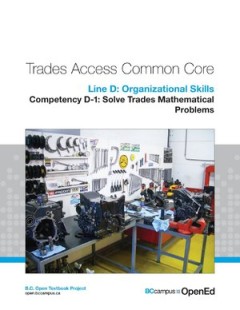
Line D: Organizational Skills, Competency D-1, Solve Trades Mathematical Prob…
Essential skills are used in every job to varying degrees and at different levels of complexity. They provide the foundation for learning all other skills and enable people to evolve in their jobs and adapt to changes in the workplace. The following list of lines and competencies was generated with the goal of creating an entry-level trades training resource, while still offering the flexibilit…
- Edition
- -
- ISBN/ISSN
- -
- Collation
- -
- Series Title
- -
- Call Number
- 650.07 COL l
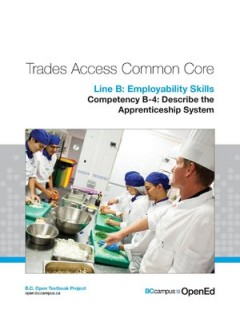
Line B: Employability Skills, Competency B-4, Describe the Apprenticeship System
This Competency provides the information necessary for you to understand the trades training system and how to explore any trades you may be interested in. Careers in the trades can be highly rewarding. Forecast shortages in skilled trades mean that there will be significant opportunities for new workers to enter many of the trades. The following list of lines and competencies was generated wit…
- Edition
- -
- ISBN/ISSN
- -
- Collation
- -
- Series Title
- -
- Call Number
- 331.207 COL l
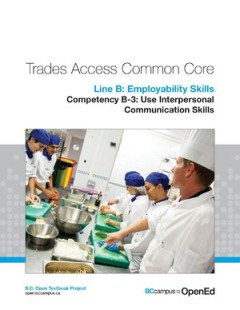
Line B: Employability Skills, Competency B-3, Use Interpersonal Communication…
No matter what your job is, you will need to communicate with other people. Your communication skills determine how successfully you receive and transmit information. Communication is arguably the most important of all life skills and plays a significant role in all aspects of work and home life. Communication is verbal, written and non-verbal, and every gesture, voice inflection or facial move…
- Edition
- -
- ISBN/ISSN
- -
- Collation
- -
- Series Title
- -
- Call Number
- 658.3 COL l
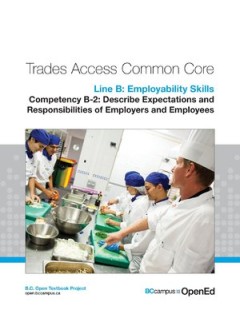
Line B: Employability Skills, Competency B-2, Describe Expectations and Respo…
As you enter the workforce, it is important to understand the major trends in employment and how to find this information. In this Competency, we’ll look some of the current major trends in employment in Canada and British Columbia. This review includes an overview of the economy, skills that employers look for, and employee expectations. We’ll also look at employee expectations and effecti…
- Edition
- -
- ISBN/ISSN
- -
- Collation
- -
- Series Title
- -
- Call Number
- 658.3 COL l
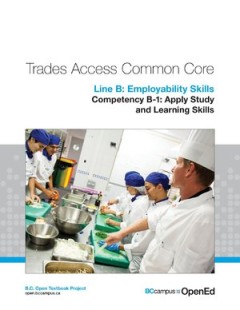
Line B: Employability Skills, Competency B-1, Apply Study and Learning Skills
Every learner has different abilities, backgrounds and life experiences. Some individuals will be entering a trades program directly from high school as part of a dual-credit program or youth initiative and have limited experience outside of the classroom. Others may have been out of the formal education system for a number of years, but bring valuable years of work experience into the classroo…
- Edition
- -
- ISBN/ISSN
- -
- Collation
- -
- Series Title
- -
- Call Number
- 375.001 COL l
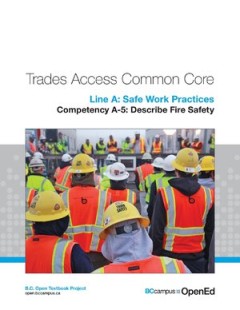
Line A: Safe Work Practices, Competency A-5, Describe Fire Safety
As a trades worker you have a responsibility to work safely, and fire prevention is a primary concern. Many of the work tasks you carry out include the application of heat and flame. You should be able to apply fire prevention practices, identify fire causes and identify and apply fire extinguishing agents to control or extinguish a fire. You are not expected to be an expert firefighter, but yo…
- Edition
- -
- ISBN/ISSN
- -
- Collation
- -
- Series Title
- -
- Call Number
- 331.25 COL l
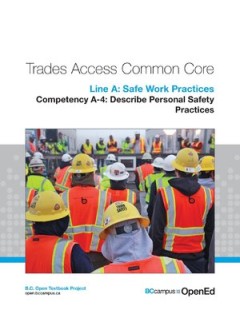
Line A: Safe Work Practices, Competency A-4, Describe Personal Safety Practices
These Learning Tasks describe the clothing and protective equipment workers must wear on the job site and the safety precautions they must take to protect themselves and others from injury. Special personal protective equipment (P.P.E.) is required on the job site. The equipment used will depend on the hazards anticipated. When working at elevations, significant hazards are present and fall pro…
- Edition
- -
- ISBN/ISSN
- -
- Collation
- -
- Series Title
- -
- Call Number
- 331.25 COL l
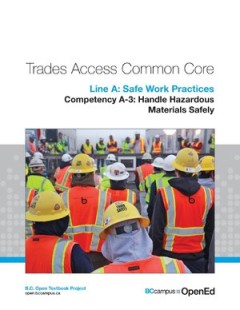
Line A: Safe Work Practices, Competency A-3, Handle Hazardous Materials Safety
Workers exposed to hazardous materials may be at risk for many serious health problems, such as kidney or lung damage, sterility, cancer, allergic reactions or burns. Some hazardous materials can also cause fires or explosions. Legislation and regulations are in place to reduce injuries or diseases caused by exposure to hazardous materials used in the workplace. Every person working with or nea…
- Edition
- -
- ISBN/ISSN
- -
- Collation
- -
- Series Title
- -
- Call Number
- 331.25 COL l
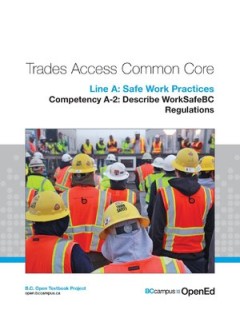
Line A: Safe Work Practices, Competency A-2, Describe WorkSafeBC Regulations
In most provinces, one or more agencies are responsible for safe, healthful working environments at job sites. These organizations normally have names such as the Workers’ Compensation Board (W.C.B.) or the Occupational Health and Safety Department. WorkSafeBC is the provincial organization that promotes workplace health and safety for workers and employers in B.C. When a work-related injury,…
- Edition
- -
- ISBN/ISSN
- -
- Collation
- -
- Series Title
- -
- Call Number
- 331.25 COL l
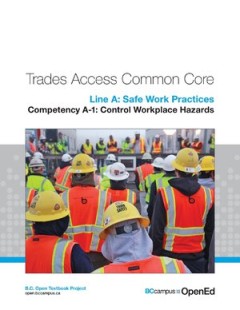
Line A: Safe Work Practices, Competency A-1, Control Workplace Hazards
Safety is a part of the job. When you take a job, you have a safety obligation to your employer, co-workers, family and yourself. By recognizing and understanding the hazards in your work area, you can prevent the occurrence of many accidents. Most accidents are preventable. Both employees and employers must take responsibility for making the workplace safe. The following list of lines and comp…
- Edition
- -
- ISBN/ISSN
- -
- Collation
- -
- Series Title
- -
- Call Number
- 331.25 COL l
 Computer Science, Information & General Works
Computer Science, Information & General Works  Philosophy & Psychology
Philosophy & Psychology  Religion
Religion  Social Sciences
Social Sciences  Language
Language  Pure Science
Pure Science  Applied Sciences
Applied Sciences  Art & Recreation
Art & Recreation  Literature
Literature  History & Geography
History & Geography